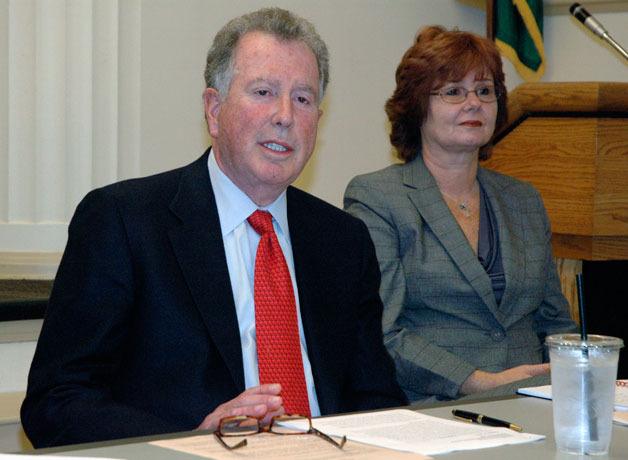EVERETT — The public hearing for US HealthVest’s Certificate of Need application, proposing to establish a 75-bed psychiatric hospital in Smokey Point, drew attendees from Arlington, Marysville and throughout the Puget Sound region on Thursday, Oct. 17.
“There’s a massive unmet need for psychiatric beds in Washington state, and Snohomish County has the most need of all,” US HealthVest President and CEO Richard Kresch said. “Washington has the lowest number of beds for psychiatric patients of any state in the country, and Snohomish County has the fewest beds per capita of any county in western Washington.”
Kresch alluded to news stories about “boarding,” when hospitals aren’t equipped for the psychiatric patients they receive, and provide them beds without treatment until they can be sent elsewhere for treatment.
If US HealthVest receives the approval of the state Department of Health, its $18.8 million, 60,000-square-foot facility could open at 15621 Smokey Point Blvd. with an estimated 200 employees in late 2015 or early 2016.
The proposed facility did have its detractors at the meeting, as both Andy Hanner of Acadia Healthcare and Mike Uradnik of Fairfax Hospital in Kirkland took issue with US HealthVest’s revisions of its application, which Hanner asserted should have “restarted the clock” on that process, and criticized for what he saw as overly optimistic projections of its patient volume.
“It’s a mentality of, ‘If you build it, they will come,’” Hanner said.
Uradnik agreed that US HealthVest’s revisions to his construction schedule and what he deemed its insufficient environmental considerations rendered it incomplete, but Karen Nidermayer of the Department of Health stated that the DoH’s position is that the application is not flawed.
By contrast, the rest of the meeting’s attendees spoke out in favor of the facility, from Rosemary Rognstad of Arlington to Jim Bloss of the National Alliance on Mental Illness.
“I’ll be your neighbor,” Rognstad said. “I’ll agree that this is most needed.”
“The lack of inpatient infrastructure is forcing people to find this care in King and even Spokane counties,” Bloss said. “The Snohomish County Jail is looking to reduce the number of individuals housed there, and those often include people with mental disorders who will be left on the street with nowhere else to go.”
Father Jay DeFolco, a pastor for the St. Anne Mission in Tulalip and the St. Mary’s Catholic Church in Marysville, likewise decried what he sees as the “revolving door” of treatment for the mentally ill at the Snohomish County Jail, where he also serves as a pastor.
“They come in, they receive their medication, they begin to function, and then they’re released onto the street, usually at 12:01 a.m.,” DeFolco said. “As soon as they act out, they get thrown back in. Their needs are different. Professionals should be addressing their underlying issues. There are facilities that can serve them, but with their often limited resources, many of them can’t afford to make those extended trips, and don’t want to be that far away from their families and friends.”
Sultan Mayor Carolyn Eslick recalled how her town’s police department had addressed their homeless problem by providing access to mental health care, and wondered aloud why she was the only elected official in attendance.
“We don’t just need 75 beds,” Eslick said. “We need 150 beds. Thank you,thank you, thank you,” she told the US HealthVest representatives in attendance.
Greater Marysville Tulalip Chamber of Commerce President and CEO Caldie Rogers had written a letter to Nidermayer in support of US HealthVest’s proposed facility.
“We believe that the Snohomish Behavioral Hospital will significantly address the shortage of psychiatric care available to residents of Snohomish County, provide care to all patients, regardless of ability to pay, and create 200 jobs for the local community in this time of high unemployment,” Rogers wrote. “Further, the land designated for this facility lends itself to future development of a ‘medical mall,’ supporting creation and/or relocation of established medical facilities, providing our city and residents, as well as all Snohomish County residents, unprecedented local one-stop access to services addressing the medical needs of our citizens and of the employers and employees of our area businesses.”
Nidermayer invited further comment by phone at 360-236-2957, or via email at karen.nidermayer@dov.wa.gov, and explained that the Department of Health’s decision would be made by Dec. 16 and posted on its website at http://dov.wa.gov, under the “Licenses/Permits” tab and the “Certificate of Need” sub-tab.








